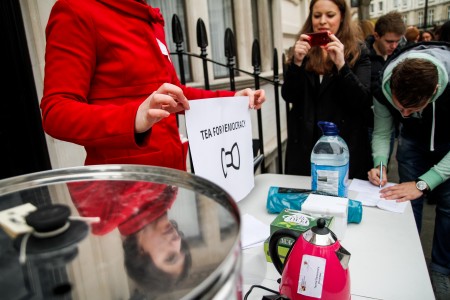Romanian diaspora raises a cup of tea for democracy

A centre-right candidate may not be everyone’s cup of tea, but the results of the recent Romanian elections can leave many of us smiling all the same. Last weekend, in an extraordinary reversal of political fortunes, Klaus Iohannis managed to overtake his political opponent Victor Ponta in the Romanian presidential elections, eventually winning with 54.5% of the votes.
Some of the new president’s policies are admirable – in his first day in office he managed to squash legislation that would have guaranteed impunity to many corrupt politicians. On the other hand, he will surely bring in more austerity and more big business. Such are the confusions of the economic and political system that we live in, and until such a day that my country will produce a truly progressive political force, not much will change in that respect.
But, just as in the recent Scottish independence poll, something significant changed in Romania over the weekend, and may bear fruit for decades to come. Somehow, the direct outcome of this election paled into insignificance compared to the process that made it happen. On a day when the 9 Romanian voters living in North Korea bothered to go to the polls, when turnout overall was 64%, and higher than 72% in some areas of the capital, Bucharest, when the electorate queued up for hours in the November cold to make sure they had a say, on such a day the real winner was democracy.
The people spoke and, in the words of the losing candidate, Victor Ponta, ‘the people are always right’. On this occasion, the electorate effected what some have termed ‘a second revolution’, 25 years almost to the day after the wave that toppled the ‘communist’ regimes of Eastern Europe. In a country where my generation grew up under the most severe dictatorship, under which any kind of citizen’s organisation was illegal and severely punished, the fact that a citizen’s uprising can and does bring about change, not once but several times in someone’s lifetime, is highly significant. It proves that people have power, that people can organise, that struggle does make sense, that political apathy is not justified and that we can win the battles whose time has come.
Indeed, some of those Romanian citizens campaigning most actively for Iohannis were those that had marched with me in the December 1989 uprising that brought down Ceausescu’s ‘Golden Age’. But they were also the ones who later got bitterly disappointed by the ‘same old same old’ governments that succeeded it. Many of them left Romania disillusioned by what it could do for them, to search for what they believed would be true freedom abroad. Those same people are vilified in the Western European press as benefit scroungers.
But in November 2014, the Romanian diaspora seems to have come of age, with an elegant and well-executed facebook campaign to encourage their compatriots to vote across the globe. Iohannis’ victory is widely seen as inspired by voters abroad outraged by the incumbent governments’ cynicism against them in the first round of the elections, when many were not able to have their say because polling stations closed when many were still waiting to cast their vote.
In response, during the second round, London along with many other European capitals became a hot-spot of electioneering, with many big-name Romanian politicians and celebrities flying out to the UK capital to queue up in solidarity with those who were determined to exercise their democratic right at the ballot box. To keep them warm and to keep spirits up, the Romanian Cultural Centre and the Ratiu Foundation for Democracy came up with an imaginative stunt:
“The misery experienced by voters during the first election round required we do something about it on the second. RF and RCC felt that helping to streamline voter preparation along with other NGOs was important, but not enough. Hence ‘Tea For Democracy’ was conceived. At least exhausted voters would find a welcoming cup of hot tea when finally within site of the voting station. It was appreciated greatly and to an extent restored people’s dignity after 6 hours of humiliation. They were being treated as human beings again.”
Nicolae Ratiu, Chairman of the Ratiu Foundation and an important figure in the UK-based Romanian diaspora.
“I was delighted to learn how a simple cup of tea can encourage people to keep queuing up for their right to vote, as well as building solidarity in the process”, was the opinion of young Romanian voter Ioana Alexandra Stan.
Hang on! How can it be that immigrants, those we are told cynically exploit a system made for their convenience and laziness, emerge as committed, organised and media-savvy active citizens? How can it be that they are so interested in their home countries that they endure the London rain and the cynicism of their own government to prove that they can cast a vote? Well, perhaps they are not benefit scroungers but true European citizens. Perhaps the UK right-wing press is wrong and we have ‘true heroes’ in our midst, or so the newly and democratically elected Romania president thinks. Whom will you believe the next time you read about those latest arrivals off the plane who couldn’t care less about our democratic values?




There were queues of families waiting to vote from breakfast time outside the Brent Civic Centre and tailing down the road towards Wembley Park station. It even delayed the traffic. Romanian children I spoke to in school following the weekend were keen to tell me all about it and excited by the event:
http://www.wembleymatters.blogspot.co.uk/2014/11/breakfast-time-queues-of-romanians-at.html